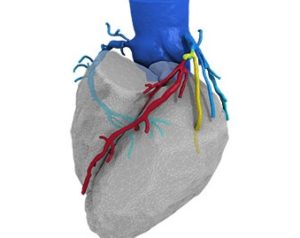
HeartFlow has announced the publication of the PACIFIC substudy showing that their FFRct Analysis demonstrates the highest diagnostic performance for detecting coronary artery disease (CAD) compared to other non-invasive tests.
The HeartFlow Analysis is a non-invasive, personalised cardiac test that starts with a standard coronary computed tomography angiogram (CTA). The publication, titled “Comparison of Coronary Computed Tomography Angiography, Fractional Flow Reserve, and Perfusion Imaging for Ischemia Diagnosis,” was published online by the Journal of the American College of Cardiology (JACC) on 14 January, and will be in print in the 22 January, 2019 issue of JACC.
The PACIFIC study included 208 patients who each underwent a coronary CTA, SPECT, PET and three-vessel invasive fractional flow reserve (FFR) measurements. The HeartFlow Analyses were retrospectively obtained using data from the coronary CTA images. On a per-vessel basis, HeartFlow demonstrated significantly greater diagnostic performance (0.94 as measured by area under the receiver operating characteristic curve) compared to coronary CTA (0.83, p<0.001), SPECT (0.70, p<0.001) and PET (0.87, p<0.001). The HeartFlow Analysis demonstrated a diagnostic accuracy of 87%, sensitivity (or ability to correctly identify those with disease) of 90% and specificity (or ability to correctly identify those without disease) of 86% on a per vessel basis. The data were previously presented at the EuroPCR conference in May 2018.
The HeartFlow Analysis leverages artificial intelligence and highly trained analysts to create a digital 3D model of the patient’s arteries using image data taken from a standard CTA. It then applies advanced algorithms to solve millions of complex equations to assess the impact any blockages have on blood flow to the heart. The HeartFlow Analysis is provided via a secure online interface to offer actionable information to enable clinicians to determine the optimal course of treatment.
The HeartFlow technology has been demonstrated to reduce unnecessary invasive diagnostic coronary angiography procedures, which can be associated with bleeding, stroke, major blood vessel damage and other serious complications. It also significantly reduces healthcare costs.
To date, clinicians around the world have used the HeartFlow Analysis for more than 25,000 patients to aid in the diagnosis of heart disease.












